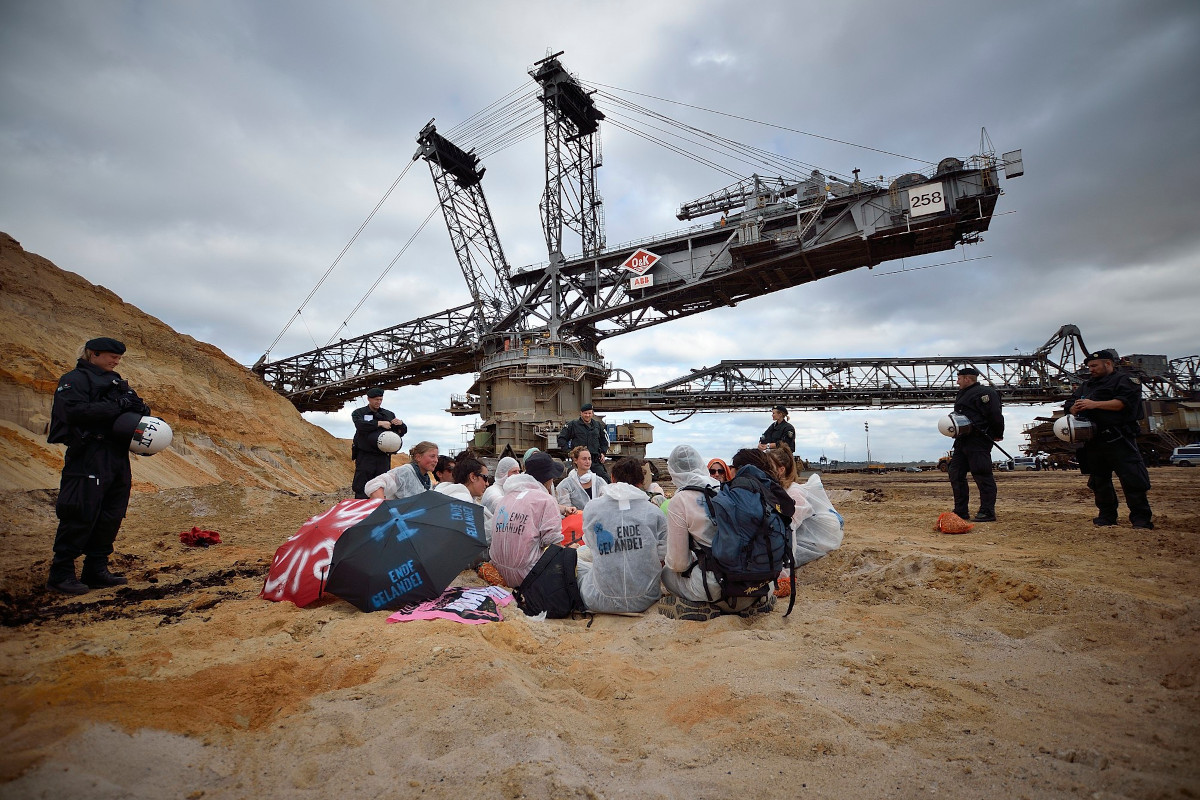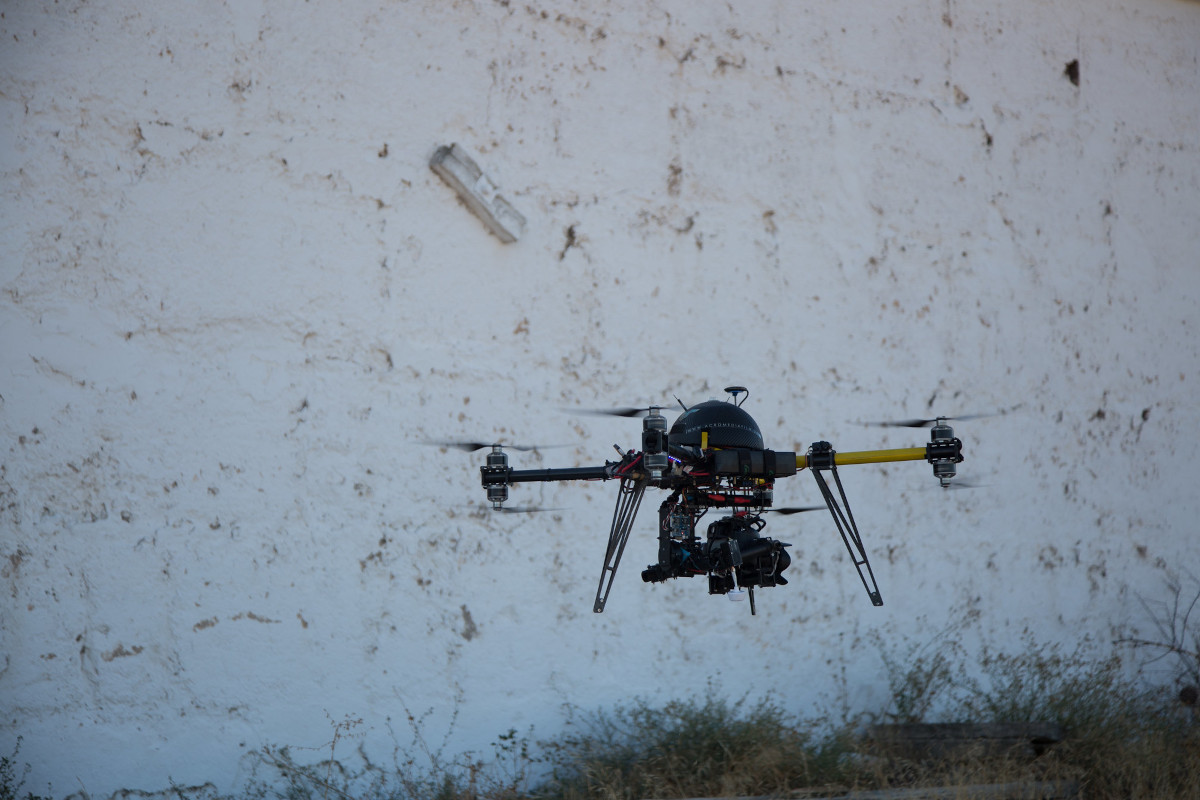The case of Civipol: commodified mobility policing in West Africa and its colonial continuities
Topic
Country/Region
28 February 2024
Current European attempts to outsource migration control to West Africa mirror historical entanglements between colonial logics, corporate interests and policing. This article looks at the place of public-private relations in French colonialism in order to historically situate the activities of Civipol, a French public-private actor owned both by the French state and major security companies, that has specialized in building African states’ internal security capacity.
Support our work: become a Friend of Statewatch from as little as £1/€1 per month.
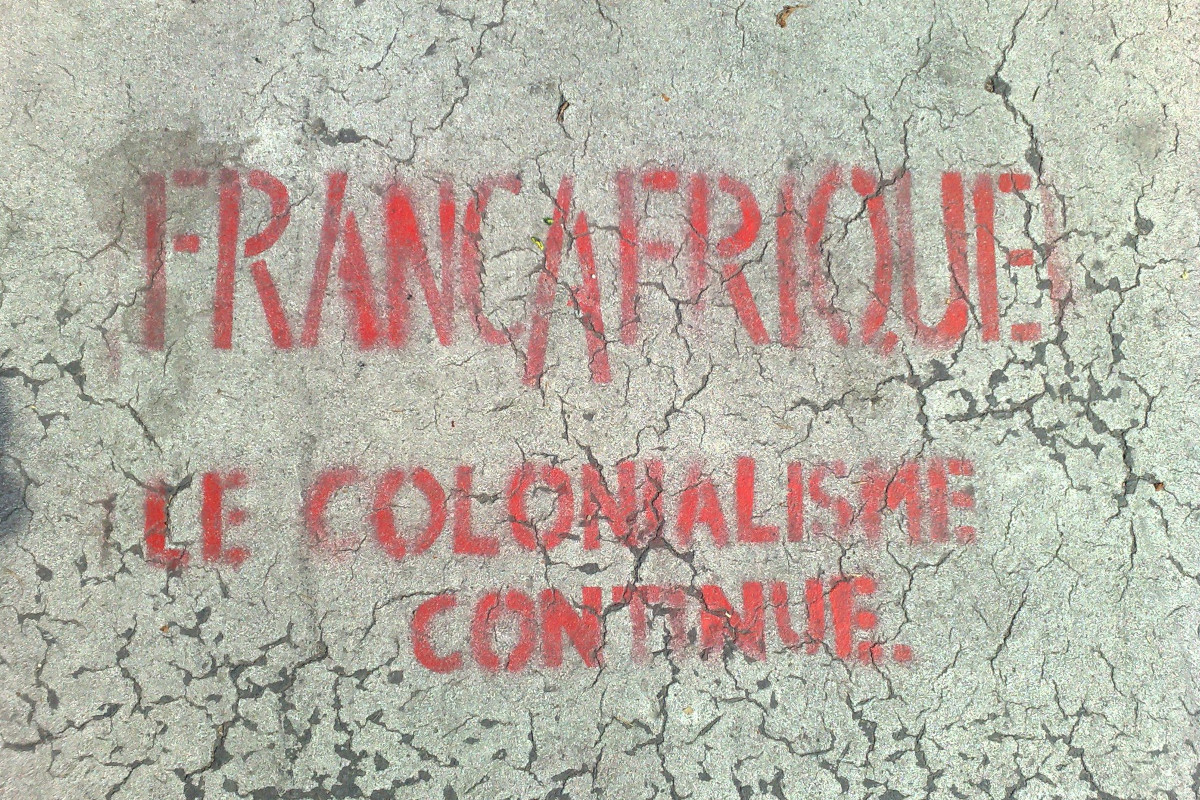
Image: Ophelia Noor, CC BY-NC-SA 2.0
This article, by Eva Magdalena Stambøl and Leonie Jegen, is based on a chapter in the collection Postcoloniality and Forced Migration. A version was also published in issue 133 of Civil Liberties & Policing.
Introduction
Our analysis builds on our frequent encounters of the French semi-private agency Civipol during our respective research stays between 2017 -2019 in different West African countries. Conducting research on topics related to migration and security governance, Stambøl was Senegal, Mali, and Niger between 2017 and 2018 and Jegen in Senegal, Ghana, and Niger in 2018 and 2019. As in-depth knowledge on the structure and objectives of Civipol obtained through research interactions such as interviews and participant observations during fieldwork remained patchy, we complemented our data with primary sources such as documents and web content, as well as secondary historical data. Putting the involvement of Civipol in a wider political perspective, we argue that the blurring between public and private interests in the contemporary European mobility policing in Africa constitutes a colonial continuity. This article is based on our chapter in the collection Postcoloniality and Forced Migration.
The concepts of “revolving credit” and “revolving doors” have been central to make sense of capturing the colonial continuities of French commodified mobility policing during colonization, continued French hegemony following formal decolonization and current European efforts to outsource border control to Africa. The notion of “revolving credit” was first coined by Kawe Nkrumah, the first President of independent Ghana and well-known anti-colonial pan-African thinker. The idea of “revolving credit” refers to the self-serving turnaround flow of capital and aid from the metropoles to (formerly) colonized territories and back. The notion of “revolving doors” captures the increasing role of European security companies within the growing field of EU mobility surveillance[1] and highlights the rotation of central stakeholders within these developments between public office, the internal security apparatus, and industry.
Corporate interests in French colonization
Mercantilism was the economic model in which early French colonialism manifested itself for 300 years, since the ancien régime of the 15th century onwards, until the French Revolution in 1789. This form of colonialism relied on trading companies which maintained trading posts along the West African coast. These trading companies’ monopolies were enabled by the French state and they constituted the main profiteers of colonialism at this time. They engaged in the transatlantic slave trade for several decades, which was finally abolished throughout the first half of the 19th century.[2] A close connection between private and public interests marked the French slave trade and plantation colonialism. An example is the lucrative decision of the board of directors of the French Company of the Indies to repeal its monopoly over the slave trade and to restore a previous system in which they could trade with independent traders.[3] However, only a few trading companies benefited from their monopolies during early colonialism. This made the African colonies during early colonialism generally rather unprofitable, making them a financial strain for metropolitan France.[4]
Throughout the 1860s French control in Africa evolved from the previous model of a purely “commercial colonialism” to one of “imperial colonialism.” This form of colonialism now included military intervention and the “civilizing mission” – the sense of a moral duty. With the simultaneous development of French industry, the colonies became increasingly important to French metropolitan economic interests during this period. This synergy resulted in imperial colonialism spurring further empire-building and contributing to the development of French capitalism and its political economy more widely. [5]
Besides the provision of raw materials crucial for the French industry, two major advantages made colonial expansion favorable for French industries: high profitability and the security linked to direct political control.[6] In this context it is not surprising that a diverse group of private actors – called “Parti Colonial” – became an important political pressure group in French colonial expansion. From the late 19th century until the interwar period, they worked to build public and political support for the French colonial project.[7]
The extent to which companies actually asserted their influence over the course of the French colonial project in the late 19th century is contested. Some historical analysis points to capitalist interests playing an important role in furthering the colonial cause,[8] while others argue that nationalist and private expansionist economic interests often diverged during this phase.[9] What, however, can be deducted from the historical analysis is the role of key actors that maintained a strong connection to both politics and business, playing a central role in building support for the colonial project. As we will show in the later sections, their influence resembles today´s “revolving doors” phenomenon.[10] The French policing of order in its occupied African territories was often directly tied to industrial and commercial interests. Hence, both the modes and intensity of surveillance and repression were dependent on the political economy of the said colony.
Trading enterprises were the main investors in private capital in the colonies and the French state was expected to enforce their monopoly. “French trading companies almost completely dominated the African colonies’ economy” until the depression following World War I set in.[11] Among the particularly important companies were family-owned firms based in Bordeaux, including the three limited liability companies known as the Grand Comptoirs which dominated the trade, banking and transport business. The way which these companies’ profit yields returned to the metropole can be captured as “revolving credit”[12] – discussed in more depth in the next section.
Policing, registration and surveillance in the French Empire
In French colonial rule over its African territories, policing was initially mainly a task for the military. Civilian administration only developed slowly throughout the 20th century. [13] Decentralization was a key organizational and administrative structure of the colonies, and the cercle was its smallest administrative unit. The commandants de cercle held high degrees of autonomy and control. Policing based on models developed in metropolitan France was introduced gradually in the colonies – especially in areas occupied by French settlers.[14]
Historical research shows[15] that the police were used by all European colonial governments across the African continent in order to secure economic exploitation, the appropriation of land, collection of taxes, and the oppression of labor movements – ensuring, among others, the colonial companies’ running of plantations, mines, and processing plants. With policemen being part of “networks of association” that included administrators, traders, and managers, the state-private relations were de facto blurred: “At the personal level as much as the structural one, the political priorities and security practices of colonial rule were thereby attuned to its economic organization.”[16] Historical research by Emmanuel Blanchard[17] has shown how the underfunding and understaffing of the French colonial police played a crucial role in their adoption of anthropometric identification techniques allowing for the surveillance of populations and mobility. These forms of control encompassed the introduction of identification documents, fingerprinting, census-taking and other forms of registration exercises. In French West Africa political surveillance and mobility control became institutionalized with the setup of the Service central de police et de sûreté de l’AOF.[18] These anthropometic identification techniques remain an integral part of ongoing EU and French-project seeking to control mobility in and from the region.
French hegemony after African decolonization
Following formal decolonization in the 1960s, France retained its influence with many of its former African colonies through “special relationships” forged with the new political elite. In fact, some argue that “decolonization did not happen if the term means the transfer of sovereignty or the gaining of independence and autonomy from a former colonial power”.[19] Capturing this context, the term “Françafrique” describes the political entanglement between France and its former African colonies, which are marked by patronage and personal relations marked by strong economic and political ties between the political elites of former colonies and colonizers.[20]
In post-World War II France, relations with African states were a domaine réservée of the president. These relations were built through formal and informal networks that spanned public and private entities. Within these networks Jacques Foccart, Charles de Gaulle’s “Monsieur Afrique,” was a central figure. These formal and informal networks “effectively blur[red] the distinction between private and public.”[21] The informal networks comprised business, military, internal security and corporatist networks, including the Jean-Christophe Mitterrand and Charles Pasqua networks as well as large enterprises such as Elf, Bouygues, Bolloré-Rivaud, and Castel, secret services, and military elements.[22]
Systems of dependency resulted from these networks at various levels – institutional, semi-institutional and informal, and through various means including cultural cooperation, development assistance, the monetary zone, the Ministry of Cooperation, the African cell attached to the President, Franco-African summits, and the networks, as well as various personal links and relations. Political elites and numerous dictators, such as Paul Biya in Cameroon, Blaise Compaoré in Burkina Faso, Idriss Deby in Chad, and Denis Sassou Nguesso in Congo were supported by France.[23] The yearly Franco-African summits, often held without published agendas, “resembl[ed] informal family gatherings rather than official intergovernmental meetings”.[24]
From an economic perspective, “Françafrique,” marked by entrenched relations between France and its former colonies, was mostly beneficial to the former colonial power. France “focused more on its own economic interests than those of African states,”[25] with development aid and monetary dependency, uphold by the franc zone, the central pillars of this relationship. The CFA franc zone has, from 1945 until today, encompassed the African Economic and Monetary Union (UEMOA), the Central African Economic and Monetary Community (CEMAC) and the Comoros. This arrangement grants France a veto on monetary policy within the Central Bank of West African States and the Central Bank of Central African States, thus providing it with institutional control.[26] French development aid, funding cultural, economic and technical programmes, is “recycled and sent back to France… through the order books of French companies.”[27] This round-away monetary flow is exactly what the concept of “revolving credit” coined by Kwame Nrumah refers to when he describes the aid and investment “paid by the neo-colonial master, passing through the neo-colonial State and returning to the neo-colonial master in the form of increased profits.”[28]
Considering military relations, France has until recently occupied the role as the main “security guarantor” of its former colonies, running numerous military bases and stationing military personnel on West African soil. Its pre-positioned forces and numerous military interventions have been considered as the “heart and symbol of French power in Africa.”[29] Meanwhile, “internal security” cooperation between France, including its secret police[30] and interior ministry, as well as African ministries of justice and interior have received far less scholarly attention. As the following section will show, French (semi) private actors and corporate interests, such as Civipol, are still playing a significant role in relations between European states and West African states – including also the EU. Further, the migration control imperative has opened new business opportunities within the internal security apparatus of former French colonies and other African states, which private companies have taken advantage of.
Civipol and its role in European border externalization
Civipol was created in 2001 and is the French interior ministry’s implementing partner for technical cooperation projects. The public-private conglomerate is co-owned by the French state (40%) and the security companies Thales, Airbus, Morpho and Défense Conseil International. Among its key stated missions is the promotion of the security industry sector. High ranking representatives in the conglomerate’s decision-making bodies have held alternating roles in the private and internal security sectors, intelligence and ministries. Some staff have also circulated between Paris and Brussels, where roles included the administration of EU aid funds. In its own words, Civipol has “the efficiency of a private company with the power of its public service mission”.[31]
Since it was granted the mandate by the European Commission to manage its programmes in 2001,[32] Civipol has become specialized in responding to European Commission’s project calls.[33] Notably, one of the earliest plans that sketched an EU maritime surveillance infrastructure, the 2003 Commission feasibility study on the ‘Control of the European Union’s maritime borders’ was formulated by Civipol.[34] The study fostered a highly securitized approach to migration, framing immigration as “migratory pressure” and facilitators of such mobility towards the Schengen zone as “transnational crime organisations.”[35] Its proposals shaped the EU approach to externalized border control and its proposals resurfaced in the European Commission’s 2003 ‘Programme of measures to combat illegal immigration across the maritime borders of the European Union’ and the 2005 ‘Global Approach to Migration’.[36] Since 2015, Civipol has also been an implementing partner of the French interior ministry’s international cooperation actions and programmes.[37]
As of September 2020, Civipol had implemented security projects under the EU Trust Fund for Africa (EUTF) in former French colonies with a total volume of €212 million, making it one of the biggest recipients of money from now-defunct Trust Fund. The projects implemented by Civipol include: border control to fight criminal networks; technical support to reinforce customs service; intelligence/information sharing between police/gendarmerie/garde nationale and maintenance of public security in ‘remote and transit zones’; disrupting cross-border criminal organisations profiting from irregular migration, human trafficking and other types of organized crime by focusing on their financial resources; and civil registries. It is the latter that we turn to now.
Civil registries, biometrization and mobility control
Civipol has been running several capacity-building projects in West Africa that focus on civil registration. They cover the formulation of civil registration policies in Cameroon, Niger and Senegal, as well as participation in high-level negotiations on civil registry components in migration agreements with Cameroon, Tunisa and Senegal.[38] At the time of writing, Civipol was engaged in implementing EUTF funded civil registry projects in Ivory Coast, Senegal and pre-coup Mali.
In Senegal the reform of the civil registry is especially sensitive. Ongoing since 1990, Civipol is the project leader of a EUTF funded project launched in 2018 that aims to “modernize” the civil registries and establish a national biometric database. This follows the Projet d’appui à la modernization de l’état civil, backed by the European Develop Fund for four years (2012-16) and which failed to achieve all its objectives.[39] The current Civipol project was launched with a two year delay,[40] which can be partially linked to the sensitivity surrounding the establishment of a national biometric database and adjacent questions of national sovereignty.[41] A central issue was the extent to which the biometric database is linked to European interests in enabling more deportations. The official description of the project makes this link rather explicit, stating that a legal study carried out in the realm of the project should among other consider the biometric database’s “use for identification purposes of Senegalese nationals in an irregular situation.”[42]
Beside their strong link to migration control ambitions, these projects have been considered to reproduce logics of “modular technology.” They create a path that makes states dependent on an ever-evolving system of technological solutions.[43] In a similar vein, others have highlighted that in cases when border and migration management serves to produce a profit, powerful lock-in effects arise due to technical innovation creating the problems it aims to solve.[44]
Neocolonial revolving credit
In this context, European attempts to influence the policy priorities of other sovereign states do not only map onto its colonial past; they also reproduce these colonial logics of revolving doors and credit. Providing a substantial source of funds for private and public-private actors, we therefore need to ask who is profiting from EU development funds. The examples considered in this article indicate that the EU’s external policy funds do not only serve the purpose of controlling or halting mobility in and from the African continent, but are also useful vehicles for maintaining the EU’s entangled development and security sectors. This allows for the return of substantial parts of the funds spent back to Europe, and in particular to France, in a neocolonial form of “revolving credit”. The blurring of public and private interests in the planning and execution of these projects, through actors such as Civipol, further indicates the importance of “revolving doors” in this process.
This article, by Eva Magdalena Stambøl and Leonie Jegen, is based on a chapter in the collection Postcoloniality and Forced Migration. A version was also published in issue 133 of Civil Liberties & Policing.
Notes
[1] vgl. Lemberg-Pedersen, M.: Private security companies and the European borderscapes, in: T., Gammeltoft-Hansen and N. N. Sørensen (Hg.): The Migration Industry and the Commercialization of International Migration, Routledge: London 2013, S. 152 – 172, und: Lemberg-Pedersen, M.: Security, industry and migration in European border control, in: A., Weinar, S. Bonjour, and L. Zhyznomirska (Hg.): The Routledge Handbook of the Politics of Migration in Europe, Routledge: London 2018: 239–50
[2] Mentan, T.: Africa in the Colonial Ages of Empire: Slavery, Capitalism, Racism, Colonialism, Decolonization, Independence as Recolonization, and Beyond, Langaa Research & Publishing CIG: Bamenda, 2017
[3] Mentan a.a.O. (Fn.2), S. xx
[4] Thompson, V. and Adloff, R.: French economic policy in tropical Africa, in: P. Duignan and L.H. Gann (Hg.): Colonialism in Africa 1870-1960, Cambridge University Press: Cambridge 1975, S. 127– 64 (Vol 4 The Economics of Colonialism)
[5] Thompson and Adloff a.a.O. (Fn.4), S. xx; Marseille, J. : Empire Colonial et Capitalisme français. Histoire d´un Divorce, Albin Michel: Paris; 1984
[6] Marseille a.a.O. (Fn.5), S. xx
[7] Andrew, C.M. and Kanya-Forstner, A.S.: The French “Colonial Party”: Its composition, aims and influence, 1885-1914, in: The Historical Journal 1971, H. 14, S. 99 – 128 (1).
[8] Abrams, J. and Miller, D.J.: Who were the French colonialists? A reassessment of the Parti Colonial 1890-1914, in: The Historical Journal 1976, H. 19, S. 685–725 (3), Marseille a.a.O. (Fn.5), S. xx
Marseille, 1984),
[9] Andrew, C.M. and Kanya-Forstner, A.S.: French business and the French colonialists, in: The Historical Journal 1976, H. 19, S. 981 – 1000, (4)
[10] Lemberg Pedersen (2018) a.a.O. (Fn.1), S. xx
[11] Thompson and Adloff a.a.O. (Fn.4), S. xx
[12] Nkrumah, K.: Neo-colonialism. The Last Stage of Imperialism, Thomas Nelson & Sons, Ltd: London 1965
[13] Manning, P.: Francophone Sub-Saharan Africa 1880–1995, Cambridge University Press: Cambridge, 2010, (2. Ausgabe)
[14] Blanchard, E.: French colonial police; in: Bruinsma, G. and Weisburd, D. (Hg.): Encyclopedia of Criminology and Criminal Justice, Springer: New York 2014: 22 – 63
[15] Thomas, M.: Violence and Colonial Order. Police, Workers and Protest in the European Colonial Empires1918–1940; Cambridge University Press: Cambridge; 2013
[16] Thomas, M a.a.O. (Fn. 16), S. xx
[17] Blanchard, E. a.a.O. (Fn. 15), S. xx
[18] Blanchard, E. a.a.O. (Fn. 15), Seite 8, S. xx
[19] Charbonneau, B., : France and the New Imperialism: Security Policy in Sub-Saharan Africa, Routledge: London/New York 2008,(2), S.55
[20] Gegout, C.: Why Europe Intervenes in Africa: Security, Prestige and the Legacy of Colonialism; Hurst & Co: London, 2017, S. xxx
[21] Charbonneau, B. a.a.O. (Fn. 20), Seite 56, S. xx
[22] Charbonneau, B. a.a.O. (Fn. 20), S. xx
[23] Gegout, C. a.a.O. (Fn. 21), S. xx
[24] Chafer in Charbonneau, B. a.a.O. (Fn. 20), Seite 59, S. xx
[25] Gegout, C. a.a.O. (Fn. 21), Seite 141, S. xx
[26] Gegout, C. a.a.O. (Fn. 21), Seite 141, S. xx
[27] Charbonneau, B. a.a.O. (Fn. 20), Seite 59, S. xx
[28] Nkrumah, K. . a.a.O. (Fn. 13), S. xx
[29] Charbonneau, B. a.a.O. (Fn. 20), Seite 65, S. xx
[30] Charbonneau, B. a.a.O. (Fn. 20), Seite 57, S. xx
[31] Civipol: ‘Civipol: The company’, [online 2020] online unter: https://www.civipol.fr/en/civipol/company
[32] Civipol: Activity Report 2016 & Outlook 2017. Paris 2017, online unter: https://civipol.themecloud.website/wp-content/uploads/2012/06/rapport_civipol_2016-2017.pdf
[33] Akkerman, M.: Expanding the Fortress, Transnational Institute, Amsterdam 2018, online: https://www.tni.org/en/publication/expanding-the-fortress
[34] Akkerman, M. a.a.O. (Fn. 34), S. xx
[35] Civipol: Feasibility study on the control of the European Union’s maritime borders - Final Report, Feasibility Study 11490/1/03 REV 1, Brussels 2003: Council of the European Union, available at: https://web.archive.org/web/20050609105234/http://register.consilium.eu.int/pdf/en/03/st11/st11490-re01en03.pdf; Lemberg-Pedersen, M., J. Rübner Hansen and O.J. Halpern: The Political Economy of Entry Governance, AdMiGov Deliverable 1.3, Copenhagen 2020, online unter: http://admigov.eu/upload/Deliverable_D13_Lemberg-Pedersen_The_Political_Economy_of_Entry_Governance.pdf, Seite 46
[36] Akkerman, M. a.a.O. (Fn. 34), S. xx, Lemberg-Pedersen et al., 2020:46 a.a.O. (Fn. 36), S. xx
[37] Civipol (2017) a.a.O. (Fn. 33), S. xx
[38] Europäische Kommission: Programme d’appui au renforcement du système d’information de l’état civil et la création d’un fichier national d’identité biométrique, 2018, online unter: https://ec.europa.eu/trustfundforafrica/sites/euetfa/files/t05-eutf-sah-sn-07_etat_civil.pdf
[39] Europäische Kommission a.a.O. (Fn. 39), S. xx
[40] Akkerman, M. a.a.O. (Fn. 34), S. xx, Civipol: Rapport d’Activité 2018. Paris 2019: Civipol, online unter: https://www.civipol.fr/sites/default/files/2019-09/Rapport%20d%26%23039%3Bactivit%C3%A9%202018.pdf
[41] Interview by Jegen with an EU member state agency, Dakar, 2019.
[42] Europäische Kommission a.a.O. (Fn. 39), Seite 10, S. xx
[43] Frowd, P. u.a.: Security at the Borders: Transnational practices and technologies in West Africa, Cambridge University Press: Cambridge, 2018, S. xxx
[44] Lemberg Pedersen (2013) a.a.O. (Fn.1), S. xx, Menz, G.: The neoliberalized state and the growth of the migration industry, in T. Gammeltoft-Hansen and N.N. Sørensen (Hg.): The Migration Industry and the Commercialization of International Migration; Routledge: London 2013,108–127.
Our work is only possible with your support.
Become a Friend of Statewatch from as little as £1/€1 per month.
Further reading
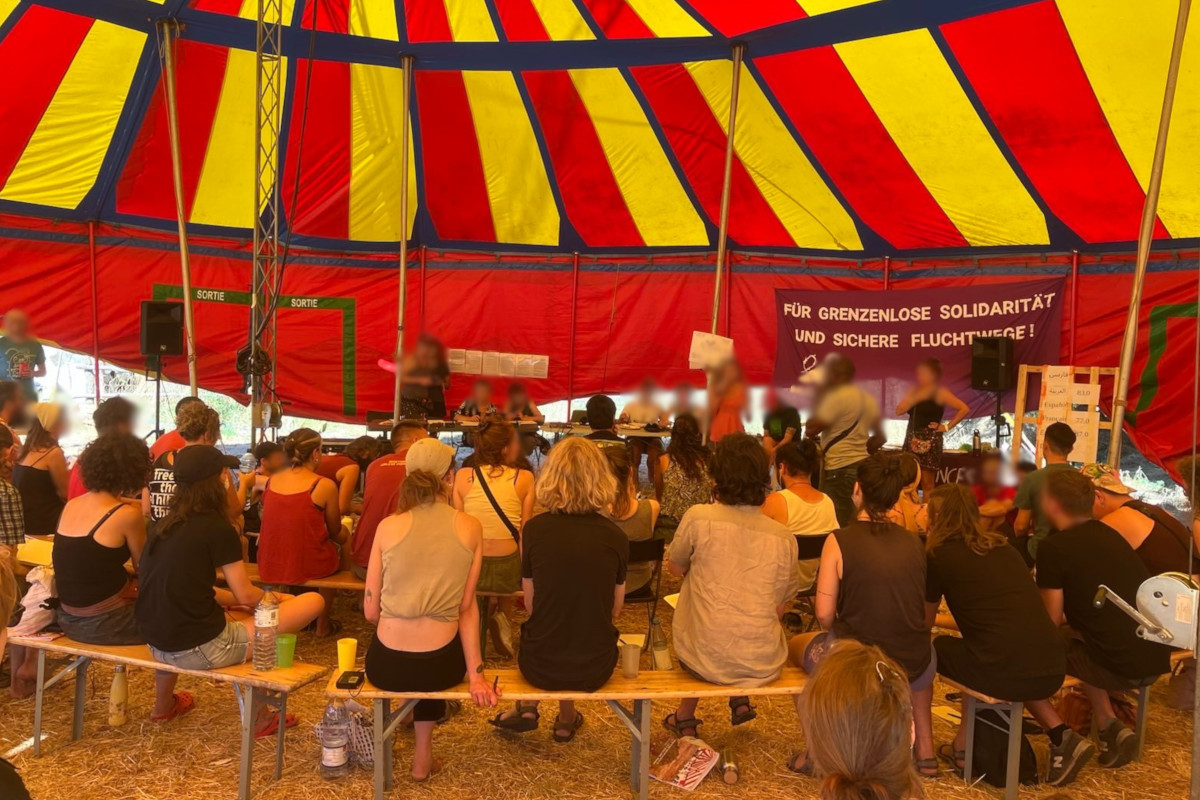
Externalisation of migration control: from the 1990s to the present
A talk given by Statewatch researcher Yasha Maccanico at the TransBorder Camp in Nantes, July 2022.
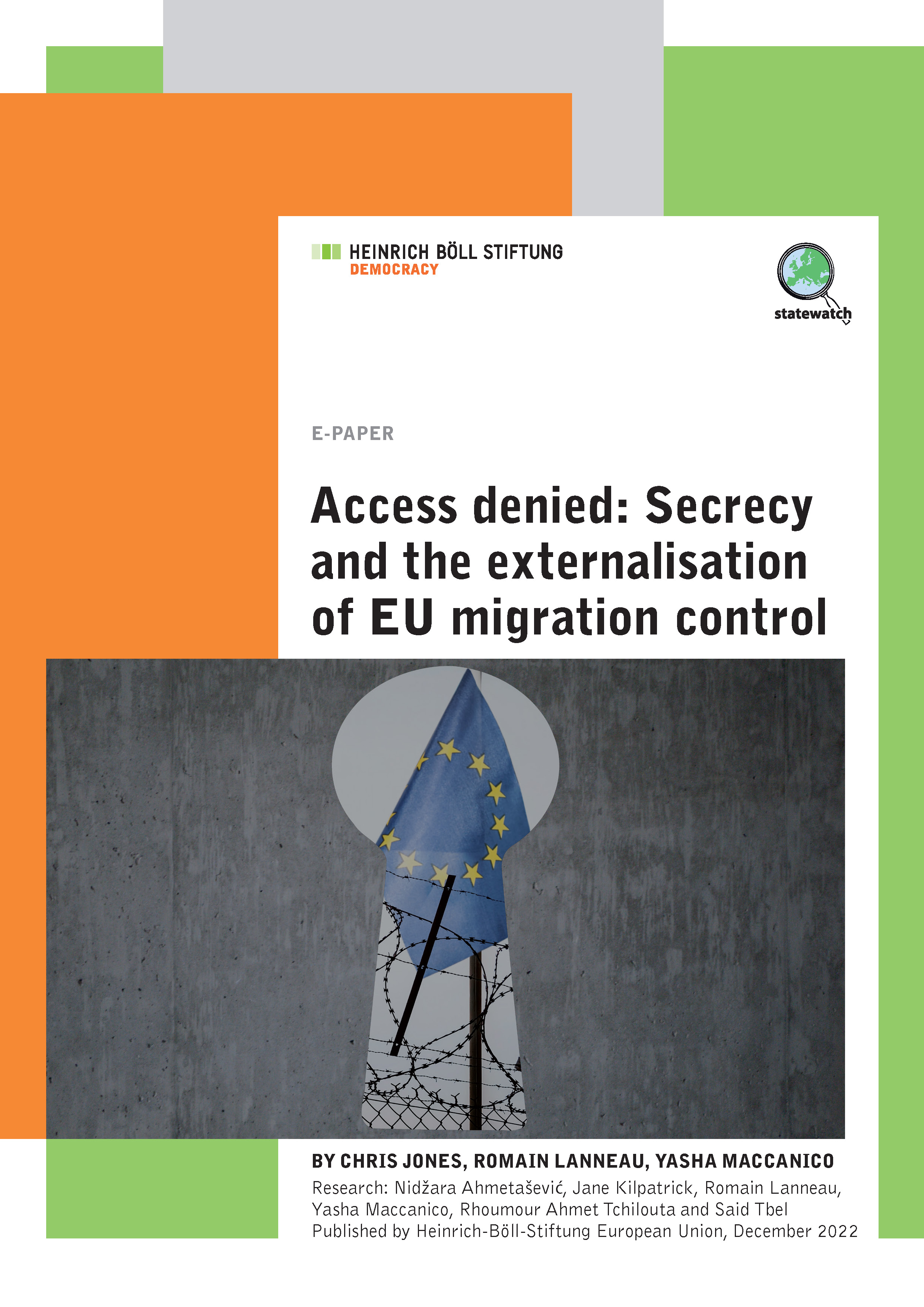
Access denied: Secrecy and the externalisation of EU migration control
For at least three decades, the EU and its Member States have engaged in a process of “externalisation” – a policy agenda by which the EU seeks to prevent migrants and refugees setting foot on EU territory by externalising (that is, outsourcing) border controls to non-EU states. The EU’s New Pact on Migration and Asylum, published in September 2020, proposed a raft of measures seeking to step up operational cooperation and collaboration in order to further this agenda.

The Melilla border deaths represent a new phase in the bloody story of Fortress Europe
On 24 June dozens of people died after attempting to cross the heavily-fortified border from Morocco into the Spanish enclave of Melilla. A report by the Nador branch of the Association Marocain des Droits Humains (AMDH), summarised and built upon here, examines the build-up to and immediate aftermath of the deadly incident. The report documents multiple human rights violations and also reveals a significant shift: from EU authorities undertaking pushbacks and leaving people to their fate in situations in which they may come to harm, to EU authorities undertaking pushbacks with the explicit knowledge that they would be beaten and treated in an inhumane and degrading manner by their non-EU ‘partners’.
Spotted an error? If you've spotted a problem with this page, just click once to let us know.
